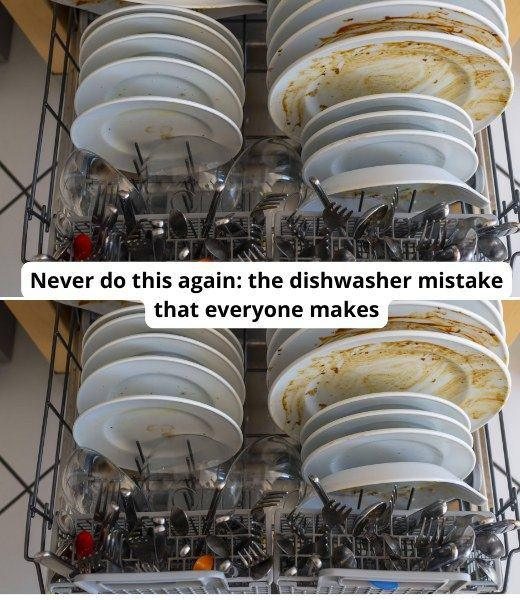ADVERTISEMENT
**Never Do This Again: The Dishwasher Mistake That Everyone Makes**
Dishwashers are a convenient and time-saving tool in the kitchen, but even the most seasoned dishwasher users can make mistakes that can damage dishes, waste energy, or leave dishes less than sparkling clean. One common mistake that almost everyone makes at some point (and many continue to make unknowingly) is **overloading the dishwasher**. While it may seem like a good idea to cram in as many items as possible to get through the dishes faster, this can cause more harm than good.
In this article, we’ll dive into why overloading your dishwasher is a mistake, how it impacts both your dishes and the appliance itself, and how to load it properly to ensure optimal cleaning results.
### Why Overloading Your Dishwasher Is a Big Mistake
1. **Poor Cleaning Performance**
Dishwashers are designed to clean dishes by spraying water through jets and using detergents to break down food particles. When the dishwasher is overloaded, the water and detergent have a harder time reaching all surfaces of your dishes. Plates, bowls, and utensils may remain dirty, especially in corners or between stacked items. The result? You’ll have to run another cycle, wasting both water and energy, and the dishes may still not come out clean.
2. **Increased Wear and Tear**
Stuffing your dishwasher beyond its capacity can cause unnecessary wear on both the dishes and the appliance. Overloading can cause plates and glasses to rub against each other during the wash cycle, leading to scratches, chips, or cracks. Over time, this can also cause damage to the dishwasher’s interior components, such as the spray arms, filters, and even the door seals. The more you overload, the greater the chances that your dishwasher will break down prematurely, leading to costly repairs.
3. **Energy Waste**
If the dishwasher isn’t properly loaded, it can lead to inefficient cleaning cycles. In some cases, overloading can cause certain areas of the dishwasher to remain dry, preventing them from being properly cleaned. In an effort to clean everything, you might end up running another cycle. This not only wastes more electricity but also uses more water, adding to your utility bills and harming the environment.
4. **Unbalanced Load Leading to Malfunctioning**
Overloading the dishwasher can sometimes result in an unbalanced load. This causes the dishwasher to work harder to distribute water and detergent evenly. An unbalanced load can cause issues such as improper drainage, reduced washing efficiency, and even malfunctions with the motor or pump.
5. **No Room for Water Flow**
Dishwashers rely on the water flowing freely throughout the appliance, spraying all surfaces of the dishes to clean them thoroughly. When the dishwasher is overloaded, the water cannot circulate properly, leading to inefficient cleaning. In some cases, overloading can cause water to splash onto the door of the dishwasher, leaking and potentially causing water damage to your floors.
### How to Properly Load Your Dishwasher
To avoid the mistake of overloading, it’s important to know how to load your dishwasher correctly. Here are some tips to help ensure that your dishes are properly cleaned and your appliance is not unnecessarily strained:
1. **Leave Space Between Items**
Instead of cramming plates, bowls, and cups together, give them enough space for the water and detergent to reach every surface. Avoid stacking dishes on top of each other or placing them too close. Arrange plates, bowls, and larger items on the bottom rack, and smaller items such as cups and glasses on the top rack.
2. **Load Items Based on Size and Shape**
Place larger items such as pots, pans, and dinner plates on the bottom rack, facing downward, so the spray arms can reach them. Smaller items, like glasses, cups, and bowls, should go on the top rack. This not only helps with proper water flow but also protects delicate items from being damaged.
For Complete Cooking STEPS Please Head On Over To Next Page Or Open button (>) and don’t forget to SHARE with your Facebook friends
ADVERTISEMENT
